Carl E. Olson's Blog, page 134
August 30, 2013
New: "By What Authority? An Evangelical Discovers Catholic Tradition" by Mark Shea
Now available from Ignatius Press:
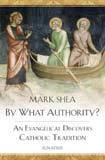 By What Authority? An Evangelical Discovers Catholic Tradition
By What Authority? An Evangelical Discovers Catholic Tradition
by Mark Shea
• Also available in Electronic Book Format
In this newly updated, expanded version of his popular work of apologetics, Shea presents a lively and entertaining look at his conversion to Catholicism from Evangelicalism and his discovery of Christian tradition. As an Evangelical, Shea accepted the principle of "sola scriptura" (Scripture alone) as the basis of faith. Now as a Catholic convert, he skillfully explains how and why Sacred Tradition occupies a central role in Divine Revelation.
Tracing his own journey of intellectual and spiritual awakening, Shea begins by looking for a rejoinder to those modern-day false prophets who would claim that Scripture itself is not to be trusted, and ends with his conviction that tradition, as explained by the Catholic Church, is the only sure guarantee of the truth of the revelation of Jesus Christ.
Mark Shea is an award-winning columnist for the National Catholic Register, and a frequent contributor to Our Sunday Visitor and other Catholic publications. He is a popular blogger, and frequent guest on radio and television.
Praise for By What Authority:
"A crystal clear and compelling case for Sacred Tradition, on the basis of logic, history and Scripture. It is simply the best I have found."
- Scott Hahn, Author, Rome Sweet Home
"This is not just another book of Catholic apologetics. It is not only a good think; it's also a good read. Concrete, clear, compelling arguments."
- Peter Kreeft, Author, Handbook of Catholic Apologetics
"An important service for Catholics, Evangelicals and all those seeking a firm grounding for Faith. Shea argues powerfully for the extra-biblical authority of Sacred Tradition as a depository and source of revelation side by side with the Bible, to which it testifies and which it interprets with authority."
- Russell Shaw, Author, American Church
What the US Can Do to Help Christians in Egypt and Syria
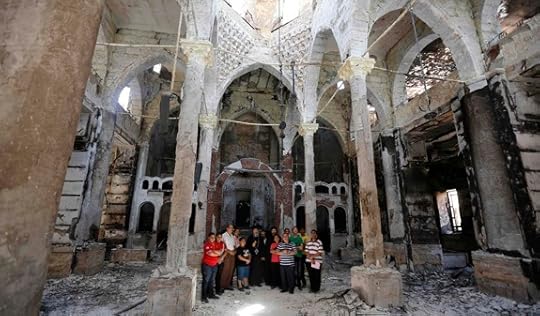
What the US Can Do to Help Christians in Egypt and Syria | John Burger | CWR
An interview with Robert P. George, new chairman of US International Freedom Commission
Robert P. George is the new chairman of the US Commission on International Religious Freedom, a panel on which he has served as a commissioner since 2012. Though he has a personal interest in religious freedom—his father’s family is Syrian Orthodox, and some of his relatives have fled Syria due to religious persecution—his outlook is global, overseeing research and reports on limitations on religion worldwide, involving Jews, Muslims, Hindus, Buddhists, and others.
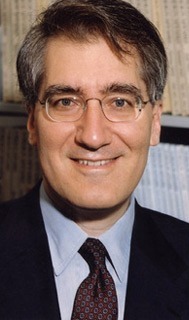
The longtime McCormick Professor of Jurisprudence at Princeton University, George is a visiting professor at Harvard Law School this year. He is the author of Conscience and Its Enemies (ISI, 2013) among other works. He spoke with CWR August 26, as the Obama administration weighed options on a military response to an alleged chemical weapons attack by the Syrian government against rebels and civilians.
The escalation in Syria came a week after tense fighting in Egypt between the country’s military and supporters of ousted President Mohamed Morsi. During the conflict, scores of Coptic Christian churches, institutions and businesses were attacked and destroyed by fire. One church that was razed, the Church of the Virgin Mary in Delga, had survived many upheavals since it was built in the 4th or 5th century. Now it lies in rubble.
CWR: What do we know about what’s going on with the Coptic Christians in Egypt?
George: The situation in Egypt and the equally horrific situation in Syria illustrate the general plight of Christians in the Middle East. These are very ancient Christian communities, going back nearly to the foundations of Christianity, in many cases. Yet, over a number of years now we’ve seen the erosion of these communities, to the point where one begins to become concerned that before too long there will be no Christian communities left in the Middle East. The Christian community in Iraq was devastated as a result of the Iraq war. Many, many Iraqi Christians fled. In many cases, they fled to Syria, of all places, and now what do we see? They’re now having to flee from Syria.
The native Syrian Christian population, as well as Christian refugees from Iraq and elsewhere, is now at grave risk. Of course, it’s not just Christians who are suffering in Syria or in Egypt, but just for the moment I’m talking about Christians. The native Christian Syrian population, which is an ancient Church—it’s actually the Church of my father and his ancestors—is now in peril. My own Syrian relatives have left and are in the United States and will probably never be able to return to their homes.
The same thing is now happening in Egypt, of course, with the Coptic Christians, who have always been at risk and have been subjected to persecutions frequently over the centuries. They are now being brutally attacked, made scapegoats. The attacks come not from simply one sector of the general Egyptian society but from several different sectors. Their churches have been burned, their businesses have been attacked, a large number have been murdered. Again, a very ancient Middle Eastern Christian community is under assault. We will begin to see and are already seeing Coptic refugees fleeing Egypt.
August 29, 2013
Father Samir Khalil Samir, SJ, on the crises in the Middle East
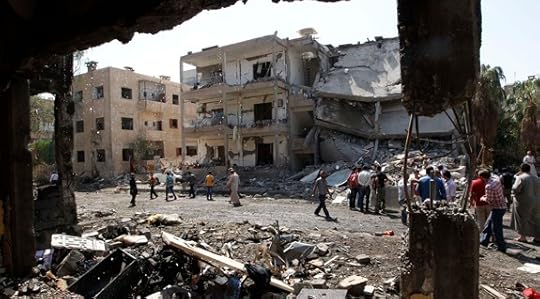
People inspect the damage at a site hit by what activists say was
a car bomb in Raqqa, Syria, Aug. 29. (CNS photo/Nour Fourat, Reuters)
“It’s not a kind of game…it is a matter of life or death for tens of thousands of Syrian people” | Catherine Harmon | CWR blog
The National Catholic Register’s Edward Pentin has an interesting interviewwith Father Samir Khalil Samir, SJ, a professor at St. Joseph University in Beirut and the Pontifical Oriental Institute in Rome and author of many books, including the excellent 111 Questions on Islam. Father Samir is a native of Egypt and a renowned expert on Islam; as such he has a fascinating perspective on the current situation in the Middle East, including his native country and Syria.
renowned expert on Islam; as such he has a fascinating perspective on the current situation in the Middle East, including his native country and Syria.
On Syria:
What is your view of the chemical-weapons attack? How certain can we be that it came from the Syrian army, as the U.S. government says?
It could be from both sides. Personally, I would never decide on such an important point without proof. We have seen what happened with Iraq 10 years ago. And those who will pay the price are not the West but the Syrians. … The situation in Syria now is very bad, very evil, but how can we be sure that an intervention will result in something better? This is the question. It’s not a kind of game where we succeed or don’t succeed. It is a matter of life or death for tens of thousands of Syrian people.
It’s not clear what the path to achieve peace in Syria is?
It’s not clear at all, and for me what makes the situation more unclear is that there are too many interested parties involved who are not unified. …
The only solution is to say: Okay, we have two Syrian positions. We have the government, with people supporting the government, and we have the opposition, with people supporting the opposition. The only people who can decide are the Syrians themselves, but cannot do so without the help of the world community.
Now what is the aim? It’s to come to a common decision, respecting both positions — to find an honest compromise between the two. If one party wins, either Assad or the opposition, we will have war or we will have a prolongation of the war.
On Egypt:
You are a native Egyptian. What are your current concerns about your homeland?
I must say, as I’ve said elsewhere: What I hear from the West is absolutely wrong. When I hear, “Finally, Morsi is the first democratically elected president” — this is a nonsense! If you take it juridically, he was elected democratically, but, juridically, so were Nasser, Sadat and Mubarak. Since 1952’s revolution, we had an elected president. So to say this statement, that he’s the first democratically elected president, is one only a non-Egyptian can make.
Secondly, we know there are reasons to explain why Mohammed Morsi was elected: because the youth [the main drivers of the 2011 revolution] were not organized as a party and because those associated with Mubarak and the old system were excluded. So, finally, the only group who was organized politically and who had the right to be elected was the Muslim Brotherhood. But where is the democracy?
… I am sure that Egypt and the Egyptians are willing to start a new stage in their political life. They are willing to have a more democratic government. They are willing to ban discrimination between men and women, Muslims and Christians, rich and poor, etc.
This is the true revolution, and I am convinced this is the wish of the people.
The entire interview—which also includes Father Samir’s thoughts on the relationship between Islam and violence, and the Muslim Brotherhood in particular—can be read here.
Regarding Syria, Father Samir’s belief that dialogue and compromise are the only route to peace echoes the words of Pope Francis on the issue. Today the Holy Father met with King Abdullah II of Jordan and discussed Syria; according to the L’Osservatore Romano summary of the meeting, “it was reaffirmed that the path of dialogue and negotiation between all components of Syrian society, with the support of the international community, is the only option to put an end to the conflict and to the violence that every day causes the loss of so many human lives, especially amongst the helpless civilian population.”
After leading the Angelus on Sunday, Pope Francis made a particular appeal for the people of Syria:
The increase in violence in a war between brothers, with the proliferation of massacres and atrocities, that we all have been able to see in the terrible images of these days, leads me once again raise my voice that the clatter of arms may cease. It is not confrontation that offers hope to resolve problems, but rather the ability to meet and dialogue.
From the bottom of my heart, I would like to express my closeness in prayer and solidarity with all the victims of this conflict, with all those who suffer, especially children, and I invite you to keep alive the hope of peace. I appeal to the international community to be more sensitive to this tragic situation and make every effort to help the beloved Syrian nation find a solution to a war that sows destruction and death.
On Ignatius Insight:
• Christians and Muslims, Living Together | Preface to English Edition of 111 Questions on Islam | Samir Khali Samir, S.J. on Islam and the West | Interviews conducted by Giorgio Paolucci and Camille Eid
August 28, 2013
Dr. Jeff Mirus: "Sisters in Crisis" by Ann Carey "is the definitive account."
The new edition of Ann Carey's Sisters in Crisis: Revisited | From Unraveling to Reform and Renewal
, published recently by Ignatius Press, continues to garner praise. Dr. Jeff Mirus, writing on the Catholic Culture site, states:
Among the more important books released by Ignatius Press recently is an updated edition of Ann Carey’s Sisters in Crisis.
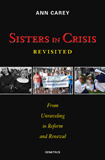 Originally published in 1997, the initial study closed before the more
Originally published in 1997, the initial study closed before the more
dramatic efforts of the Vatican to reform women religious in the United
States. The new 2013 edition, Sisters in Crisis Revisited: From Unraveling to Reform and Renewal,
brings the chronicle up to date, including the Apostolic Visitation of
Women Religious and the response to it, and the investigation of the
Leadership Conference of Women Religious (LCWR).
Carey’s work is no mere overview. It does not simply summarize the
conclusions reached long ago by knowledgeable Catholic insiders. The
author has done both comprehensive and meticulous research into the
patterns of religious life in the United States between about 1950 and
the present, enumerating the stresses and strains caused both by
explosive growth in the mid-20th century and by the revolutionary
secularization of religious culture as the century wore on. The reader
gains a clear idea of why the Vatican was talking about the renewal of
religious life even before the Second Vatican Council, why that renewal
was very slow to be undertaken, and how a spirit of rebellion and
dissolution overtook many religious communities after the Council,
during the last third of the century. ...
Carey draws from primary sources, secondary sources and interviews to
formulate her comprehensive account, which runs to some 400 pages,
fully-footnoted, along with a five-page bibliography and a 22-page
index. Certainly the issues are momentous; the prose is smooth and
well-organized; the book is neither dull nor difficult to read. But make
no mistake: This is the definitive account. It will remain an important
reference on American religious life for generations to come.
And, after providing some quotes and specific examples, Mirus concludes:
It is all thoroughly chronicled and explained in this remarkable book.
If you want to delve more deeply into the history of the life of women
religious in the United States over the past sixty years, do not be
deceived by propaganda from any other source. Ann Carey knows the real
story, the complete story, and she tells it extraordinarily well.
Read his entire review. Carey's book is also available in Electronic Book Format.
On Addressing the Dignity of Man and Masculinity
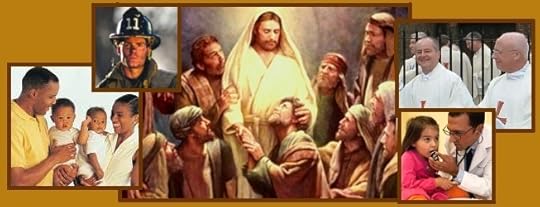
On Addressing the Dignity of Man and Masculinity | Fr. David Vincent Meconi, S.J. | HPR Editorial
How would men today be more able to live out their own unique discipleship and role in both the world, and in the Church, if we were able to articulate how men embody the Christian vocation to holiness in exclusive and particular ways?
Holy Father Francis’ opening World Youth
Day, and his first trip back to his beloved South America, were
truly victories for Christ and his Church. The trick the popular media
oftentimes tries to pull, in the face of such successes as this, is to
avoid reflecting and reporting on the actual events, and instead
grabbing one or two peripheral (and hopefully incendiary) events or
comments. (We see this every January 22, when major networks and papers
refuse to report on the thousands upon thousands who march in protest
against abortion every year in our nation’s capitol.) That is why most
of the news stories coming out of World Youth Day did not focus on the
millions who came to pray with the Church universal at Mass on
Copacabana beach, or on the many conversions to Christ experienced by
the young people (evident in their own blogs and Facebook pages), but
rather news reports concentrated on Pope Francis’ answers to two
“loaded” questions on his return flight.
One question had to do with his
understanding of women’s vocations in the Church today, to which he
responded that “we don’t yet have a truly deep theology of women in the
church. We talk about whether they can do this or that—can they be altar
boys, can they be lectors, or can a woman be president of Caritas—but
we don’t have a deep theology of women in the church.” This is the
context and the call during which Pope Francis also offered how: “A
church without women would be like the apostolic college without Mary.
The Madonna is more important than the apostles, and the church herself
is feminine, the spouse of Christ and a mother.” The Holy Father thus
sees a need to develop a particular theology of women that goes beyond
the wearisome and worldly question of women’s ordination—of what women
can “do”—and to bring this conversation into something more
foundational, more fruitful—of what woman “is” (for a beautiful analysis
of this exchange, see: http://www.washingtonpost.com/blogs/on-faith/wp/2013/08/05/2079/).
The other topic that the media keeps focusing on is Pope Francis’
response to their questions concerning gay men.
The Transgender Culture Wars
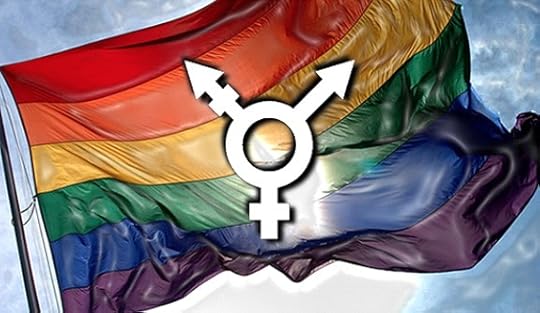
The Transgender Culture Wars | Anne Hendershott | CWR
Serious discussion of gender-identity disorder is becoming increasingly politically incorrect. Soon it will disappear altogether.
A
few weeks ago, readers of the New York
Post were confronted with a story whose sensational title was
characteristic of the tabloid: “I’m a Guy Again! ABC newsman
who switched genders wants to switch back.” Replete with pictures of Don
Ennis both as a woman and a man, the article informed readers that the ABC news
editor “strolled into the newsroom last May wearing a little black dress and an
auburn wig and announced he was transgender and splitting from his wife. He
wanted to be called Dawn.”
By
August, Ennis said that he had suffered a bout of amnesia, which led to the
realization that he wants to live his life again as Don. The newsman is now
asking his co-workers and “all who accepted me as a transgender to now
understand that I was misdiagnosed…I am already using the men’s room and
dressing accordingly.” He also has reassured the lesbian, gay, bisexual, and
transgender community that “even though I will not wear the wig or the makeup
or the skirts again, I promise to remain a strong straight ally, a supporter of
diversity and an advocate for equality and other LGBT issues including same-sex
marriage.”
It
is no surprise that Ennis would feel compelled to continue his support of the
LGBT community—even though he is no longer participating in the transgender
lifestyle. It is likely that if he were viewed as unsupportive of those who
experience gender-identity disorder, he would be quickly ostracized in his
newsroom community—and beyond.
Transgender
issues have been prominent in the news all summer. Most recently, on August 22
Army Pvt. Bradley Manning, sentenced to 35 years in military prison for leaking
classified documents, announced that he intends to begin hormone treatments so
he can live the rest of his life as a woman named Chelsea. Claiming that the
Army’s “Don’t Ask, Don’t Tell” policy contributed to psychological problems and
to his gender-identity disorder, Manning has stated that he wants to begin
hormone therapy as soon as possible. The Army has said that it does not provide
hormone therapy or sex-reassignment surgery, but Manning’s lawyers have said
they hope the military “does the right thing” and pays for the treatment, so
that the soldier does not have to sue in military or civilian court.
Catholic
teachings on transgender issues
Catholics
are called to treat all—including all within the LGBT community—with compassion.
August 27, 2013
Fr. Longenecker: "Ann Carey’s book is such a treasure. It’s measured. It’s documented."
Fr. Dwight Longenecker has penned a review of Ann Carey's book, Sisters in Crisis: Revisited | From Unraveling to Reform and Renewal
, published this summer by Ignatius Press. He writes:
This professionally researched and meticulous book will remain a
historical resource for all those who wish to understand how in the
space of forty years an army of faithful Catholic sisters ended up as
new age, politically correct drones of the left.
Carey explores the problems in the religious orders before the Second
Vatican Council and takes the readers step by step through the half
baked, ill thought out “renewal” in the religious life that took place
after the council. She chronicles the biased propaganda disguised as
‘surveys’, charts the disastrous results of group therapy sessions and
the open rebellion of the sisters against first their own rules of life,
then the authority of the church and then against the Christian faith
itself so that some of them are now not only in favor of same sex
marriage, abortion and champions of a range of left wing projects, but
they moved “beyond Christ.”
After discussing some specifics of the book, Fr. Longenecker concludes:
This is why Ann Carey’s book is such a treasure. It’s measured. It’s
documented. It is not a polemic, but a solid historical study of the
disaster in Catholic women’s orders in the USA. Furthermore, her study
of the women’s orders is valid reflection of the condition of the whole
Catholic Church in the USA. Just as there are now two conferences of
superiors of women’s religious orders–one she calls ‘change oriented’
and the other ‘traditional’ so there are two Catholic churches in
America–one that is actually in a state of constant, understated dissent
from Catholic teaching and the other which lines up behind the
magisterium, the Sacred Scriptures and the Holy Father.
Read the entire review on the "Standing On My Head" blog.
Carey's book is also available in Electronic Book Format.
US Bishops Push Immigration Reform with Legislators
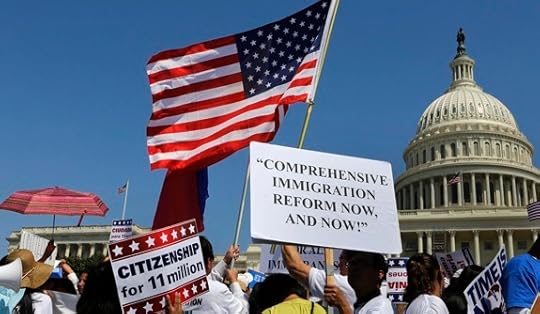
US Bishops Push Immigration Reform with Legislators | John Burger | CWR
During the summer slowdown, the USCCB keeps up the pressure on Congress to reform immigration regulations.
As summer winds
down and the congressional August recess dwindles, the efforts of the United
States Conference of Catholic Bishops and other advocates of immigration reform
are still at a high level.
“We’re in a lull,
but it’s an important lull,” said Kevin Appleby, the USCCB’s point man on immigration.
“We’re trying to rev up support in the dioceses and districts to make sure that
[congressional] representatives know they’ve got support for this….. What
happens from the first of August to the ninth of September will help determine
the final outcome of what happens in Congress. If all goes well, they’ll pass
some measures in October, put them together and conference them with the Senate
and we’ll have a fairly good bill by the end of the year.”
"Over the August recess we’re encouraging
people to get the message out to their representatives that we need to fix our
broken immigration system,” said Kim
Daniels, spokeswoman for Cardinal Timothy Dolan, president of the US Conference
of Catholic Bishops. “We’re called to help our brothers and
sisters who are living in the shadows, and we want to take that message to our
representatives so that we can pass immigration reform."
Most observers
consider the bipartisan immigration reform bill the US Senate passed in June to
have little chance of being introduced in the House of Representatives. House
Speaker John Boehner, R-Ohio, is insisting that any immigration bill brought to
the floor of the House have the support of a majority of the Republican
conference. But a number of bills have been introduced in the House to reform
various aspects of immigration policy, including one that would provide 20,000
additional Border Patrol agents, 350 miles of fence, and billions of dollars
for security.
Another is the
Kids Act, introduced by Reps. Eric Cantor, R-Va., the House Majority Leader,
and Bob Goodlatte, R-Va., chairman of the Judiciary Committee, which would
provide a path to legalization for children who were brought here as infants by
parents who entered the country without proper authorization.
President Barack
Obama has been pushing for immigration reform to address the problem of the 11
million undocumented immigrants in the country, and many Republicans are trying
to balance a need to gain support from the growing Hispanic-American
demographic with the need to address the concerns of more conservative
constituents, many of whom oppose giving a break to immigrants who “jumped the
line” ahead of those who went through the proper channels to live and work here
legally.
The bishops’
conference also is calling for research into the reasons why people decide to
come to this country—and find ways to address the problems that spur them to
leave their own country.
Carl's Cuts for August 27, 2013
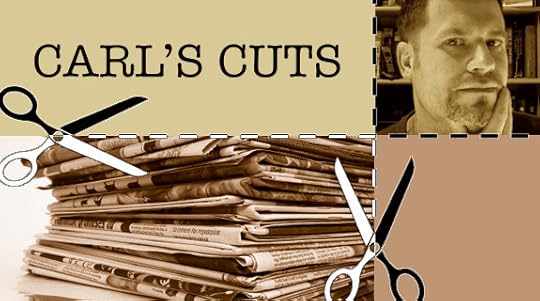
Carl's Cuts for August 27, 2013 | Catholic World Report blog
• Having
recently
published Dale Ahlquist's review of Fr. Robert Wild's book, The
Tumbler of God: Chesterton as Mystic (Angelico Press, 2013), I
was reading a bit about Servant of God, Catherine de Hueck Doherty
(1886-1995), as Fr. Wild is the postulator for her cause. I confess
that I knew very little about her life and work until then. Here is a
good example of her writing:
One
of the things I noticed going on today is a constant discussion of
the fact that the Church is too structured, too this, too that, and
that we have to start a movement of liberation from the structures. I
prayed about this and it came to me that the simplest answer to
‘structure’ is holiness. People are over-structured when they are
not holy. Holiness is total security, because holiness is total
surrender. Holiness is a total commitment for others. Now when you
have that kind of attitude, there is no problem of structure.
Can
you imagine St. Francis worrying about structures? If they came his
way, he accepted them. If they did not come his way, he couldn’t
care less about them. They didn’t bother him very much. What he
cared about was our love for God and man.
If
we want to unstructure a structure that is no good, the simplest way
is to become holy. Those wonderful people called saints unstructured
things by their holiness.
Read
more on the www.catherinedoherty.org
site, including a recent essay by Fr. Wild titled, “Catherine:
Creator of Catholic Culture”.
• Joseph
Bottum recently wrote a piece for Commonweal (paid for by a
grant from the Henry Luce Foundation) outlining “A
Catholic's Case for Same-Sex Marriage”. Actually, “outlining”
is not the right word, as the 9,000-word-long essay is more like a
sprawling, unedited ramble delivered by one's quirky Uncle So-and-So,
who possesses a plentitude of ideas but doesn't seem quite sure of
his argument or stance—yet is going to keep at it as long as need
be. Here is just one quote, from the opening of the essay:
We
are now at the point where, I believe, American Catholics should
accept state recognition of same-sex marriage simply because they are
Americans.
For that matter, plenty of
practical concerns suggest that the bishops should cease to fight
the passage of such laws. Campaigns against same-sex marriage are
hurting the church, offering the opportunity to make Catholicism a
byword for repression in a generation that, even among young
Catholics, just doesn’t think that same-sex activity is worth
fighting about. There’s a reasonable case to be made that the
struggle against abortion is slowly winning, but the fight against
public acceptance of same-sex behavior has been utterly lost.
Of course, if Bottum had written a piece titled, “A Catholic's
Case for Abortion”, in 1975 or so, it would likely say, “We
are now at the point where, I believe, American Catholics should
accept state recognition of abortion simply because they are
Americans.” And so forth. Frankly, I'm quite grateful that
becoming Catholic has freed me to see the many errors of doing this
or that just because that is what Americans believe and do. In
addition, being Catholic has taught me that some fights aren't won
in this lifetime; in fact, the fight against sin—whatever it might
be—will continue until the eschaton. Bottum, it seems, is
suggesting a path shaped by prudential judgment, but capitulation to
falsehood and immorality is never prudent, and I don't see how his
approach can be described as anything other than capitulation. There
have already been many responses. Two that might be of interest are;
first, the
one given by Mattias A. Caro on the Ethika Politika site, which
is more positive than my own general assessment, and, secondly, this
one from the keyboard of Robert Royal, on The Catholic Thing
site, which I think hits the most important nails squarely on the
heads.
• Bottum
talks a great deal about “enchantment”, stating, for example,
“The goal of the church today must primarily
be the re-enchantment of reality.” It's an intriguing assertion,
and I certainly don't dismiss it out of hand. But it involves an
entire discussion of what said “enchantment” really is. I think
it must begin with the very first things, specifically the nature of
God, of creation, and of the creature called man.
Earlier this month, I taught a 15-hour
course in ecclesiology in the lay ministry program of the Archdiocese
of Portland. I think some of the students were surprised that I
didn't talk about hierarchy, laity, and the external structures of
the Church until Day 4—not because those aren't important subjects
(they certainly are), but because I'm convinced that ecclesiology
must begin with the questions, “Who is God? Why did he create? What
is man?” Ecclesiology, as the Catechism of the Catholic Church
certainly expresses, is based on a solid theo-logy and a sound
anthropology:
Continue reading on the CWR blog.
August 26, 2013
Fighting the Homogenous Regime of Dull Diversity
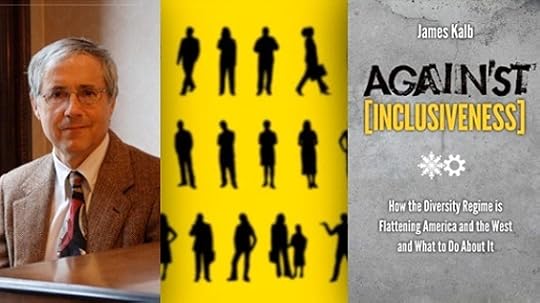
Fighting the Homogenous Regime of Dull Diversity | Jerry Salyer | CWR
A review of James Kalb’s new book, Against Inclusiveness: How the Diversity Regime is Flattening America and the West and What to Do About It
“[O]ne cannot abstract from the
historical situation of the nation or attack the cultural identity of the
people. Consequently, one cannot passively accept, still less actively support,
groups which by force or by the manipulation of public opinion take over the
State apparatus and unjustly impose on the collectivity an imported ideology
contrary to the culture of the people.”
– Instruction on Christian
Freedom and Liberation, Congregation
for the Doctrine of the Faith
Clearly it is not science but
rather scientism which is central to the society depicted in Aldous Huxley’s
1931 science fiction classic, Brave New World. Toward the end of this dystopian novel about
a hedonistic global order comprised of shallow, self-absorbed clones, one
member of the ruling elite admits that he and his fellow rulers are deeply
suspicious of any sort of intellectual exploration. “Science is dangerous,” explains the World
Controller, “we have to keep it most carefully chained and muzzled.” True, the
elite constantly bombards its biomanufactured subjects with propaganda about
scientific achievements, yet what slogans like “Science Is Everything” actually
refer to is not science as traditionally understood but a kind of god, an
absolute authority figure which demands unquestioning obedience to the status
quo in exchange for the creature comforts of advanced technology. Science as the pursuit of truth has long
since been banished by the soft-totalitarian global government, since such
truth might provoke reflection about the ultimate nature of the cosmos and
thereby destabilize society.
I found myself recalling all this
as I read James Kalb’s new book, Against
Inclusiveness: How the Diversity Regime is Flattening America and the West and
What to Do About It (Angelico
Press, 2013). A timely,
incisive work, Against Inclusiveness builds upon themes introduced in
Kalb’s previous work, The Tyranny of Liberalism, and presents a precise,
methodical examination of the real-life dystopia we inhabit. “[S]cientism and postmodernism go together,”
Kalb observes, “and the two can exist independently of actual science.” The rationalist who denies the soul, the
deconstructionist who denies the ability to know anything at all, and the
globalist who denies national identity are all working together to dehumanize
the planet, as it turns out:
In effect
scientism tells us that there are no transcendent goods, just desires, that
there are no essences of things that we should respect, and that the world is
what we make of it. From this it follows
that the rational approach to politics, social life, and morality is to treat
the world as a resource and turn the social order into a kind of machine for
giving people in equal measure whatever they happen to want, as long as what
they want fits the smooth working of the machine.
Human beings themselves become
mere cogs, continues Kalb. “To demand inclusiveness is to demand that these
human components be distinguished only by reference to the demands of the
machine and otherwise be treated as interchangeable.”
Neutral though the social machine
purports to be, it inevitably exhibits de facto preferences.
Carl E. Olson's Blog
- Carl E. Olson's profile
- 20 followers



